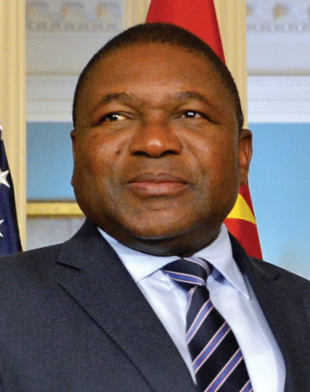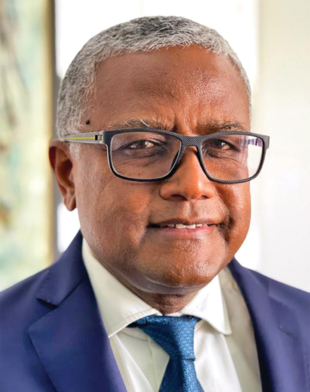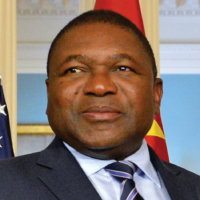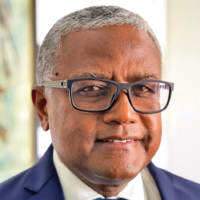Home to Africa’s largest foreign direct investment project — the $20 billion liquefied natural gas terminal under development by international energy titan TotalEnergies in Cabo Delgado province — Mozambique is writing an exciting new chapter in its rich history.
That showcase energy project and other significant developments in the LNG sphere and the lucrative mining, oil and gas industries are fueling record socioeconomic development in the country of 32 million people.

While such inflows of FDI and their impact on living standards are welcomed, the government of President Filipe Nyusi is well aware of the need to invest the huge windfalls into promoting human development. In particular, monies are being allocated to social activities, education, employment and welfare initiatives for the communities affected by the infrastructure projects.
“There is need to attach importance to the diversification of our economy; we should not just focus on gas, oil or mining,” Nyusi said. “We need to diversify our economy, especially as we have traditional activities such as agriculture, where we need to modernize and upgrade our technology, as well as expand the production in different areas.
“Mozambique can play an important role in energy transition through natural gas. We can be a solution, and we want to be part of this solution, looking carefully at our measure indicators. One to capitalize is sovereignty of food security. Mozambique should be able to feed itself and other countries as well.
“Regarding energy, we are supplying LNG to Europe to assist in quelling the crisis (caused by the conflict in Ukraine). We are not competing with anyone, but we want to be part of the solution to the problems of the world. We want to reduce dependence as well. Mozambique should be self-reliant and self-sufficient in many sectors.
“That’s why we are capitalizing on the issue of peace,” he added. “Without security, for us to develop our hydrocarbon projects cannot happen in an environment that is lacking in peace. That’s why diplomatically we are trying to have more friends. We want to have zero enemies and are promoting a win-win cooperation.”
Japan’s cooperation benefits both sides
As a leading beneficiary of the Tokyo International Conference on African Development Mozambique has participated for many years in a structure that strengthens relations in multilateral cooperation and partnership.
TICAD has not only ensured a steady flow of Japanese investment into African countries like Mozambique, but also paved the way for development under the principles of African ownership and international partnership.
“We want that relationship of partnership with the private-sector investment,” Nyusi explained. “Nacala Port is a good example of this mutually beneficial cooperation, with the port having been expanded and the terminal modernized and equipped.
“This was a major project because Nacala Port is the deepest of the deepwater ports of Mozambique. It is at an area where we have an excellent airport. It’s a special economic zone and has a railway line that connects Malawi through Nacala Port for many products.”
Support for Japanese investment in Mozambique is provided by both governments. In May, Prime Minister Fumio Kishida pledged during a visit to Maputo to provide the help needed to promote Japanese investment in natural gas projects as the African country seeks to develop more of its lucrative offshore LNG reserves.
“Japan will encourage the entry of more Japanese businessmen in Mozambique,” he reaffirmed. “Cooperation in the energy sector with the development of LNG projects will continue.”
Tokyo-based trading house Mitsui & Co. holds a 20% stake in TotalEnergies’ flagship project, while the Japan Bank for International Cooperation has provided loans and the Japan Organization for Metals and Energy Security has also invested large sums.
Regardless of the sector and scale of development, a core component of new projects is funding, which is where state-owned bank Banco Nacional de Investimento comes into play. The bank provides long-term financing for sustainable ventures that contribute to social and economic development. In recent years, it has implemented government protocols with other countries to facilitate public-private partnerships between foreign and state-owned firms.

“Our intention is to become a large-scale investment bank focused on infrastructure development as well as large-scale manufacturing on a profit-making basis, which calls for co-funding with the other financial institutions,” BNI Chairman Omar Mitha stated.
“At the same time, we’ve been a conduit for the state to support small- and medium-sized enterprises amid natural disasters and the pandemic that dashed companies’ financials.
“The most important aspect is we have a credit system to analyze the risks. Even though there is this element, it will at least require the minimum of a business plan that will ensure coverage of the debt servicing during the tenor of the loan.”
Japanese know-how highly sought
Turning his focus to the broad range of FDI openings in Mozambique’s economic sectors and industries, the senior financial executive is eager to highlight some of the areas ripe for investment, including those in which Japanese enterprises have plenty of experience.
“There are so many opportunities for Japanese businesspeople, such as mining and agriculture,” Mitha said. “We are an excellent food producer and are well-positioned to link Mozambique with Japan in terms of food production. We have a very long coast and Japan is very much advanced in the extraction of fish.
“Other industries include timber, tourism, information and communications technology and the automotive sector. Toyota is No. 1 in terms of market share in Africa as the sole brand that you see in every street. Mozambique would be the ideal place to relocate some automobile plants to shrink the distance between Japan and other market segments. We are better positioned for the Middle East and even for Europe. That would be an opportunity.”
According to Mitha, Mozambique’s renewables sector would be especially attractive for Japanese companies, given that Japan has been diversifying its energy types and sources as part of a post-Fukushima energy security plan.
In addition, he noted Japanese firms, workers, technology, knowledge and experience are highly valued and respected around the world, given their focus on quality and efficiency.
“We have lots of renewable energy and Japan is a good market,” Mitha stated. “Our reserves are secure for the next 40 years and we’re well-positioned because we look into the Indian Ocean and the Far East. Many Japanese companies are already here, working on important projects that include key infrastructure development.”
One such example is Mitsui, which has been active in Mozambique’s showcase LNG project since 2010. The company works very closely with the government and other partners to try to commercialize gas discovery, which includes the establishment of proper legal stability for large-scale FDI, including the LNG project.
“Mitsui has been contributing to the project by utilizing its abundant knowledge of and experience in the LNG industry to help develop a competitive strategy for the project development itself, as well as for marketing and financing, and to make a significant contribution to the prosperity of Mozambique at the same time,” said Mitsui Chairman Tatsuo Yasunaga.
“With its strategic location, the project has direct access to the Pacific and Atlantic markets. Also, as its gas resources have a very low carbon dioxide content, it has strong advantages in terms of carbon intensity and will also be competitive from an energy transition perspective.
“Furthermore, the existing long-term sales and purchase agreements provide the buyers with a reasonable amount of flexibility in terms of destinations, and Mitsui’s robust LNG trading portfolio will give further flexibility to the diversification of energy procurement sources,” he said.
We want to thank Mozambique’s Ambassador to Japan Jose Maria Morais for his support in compiling this report.
https://info.japantimes.co.jp/international-reports/pdf/20231227-GI-Mozambique.pdf
www.global-insight.net




